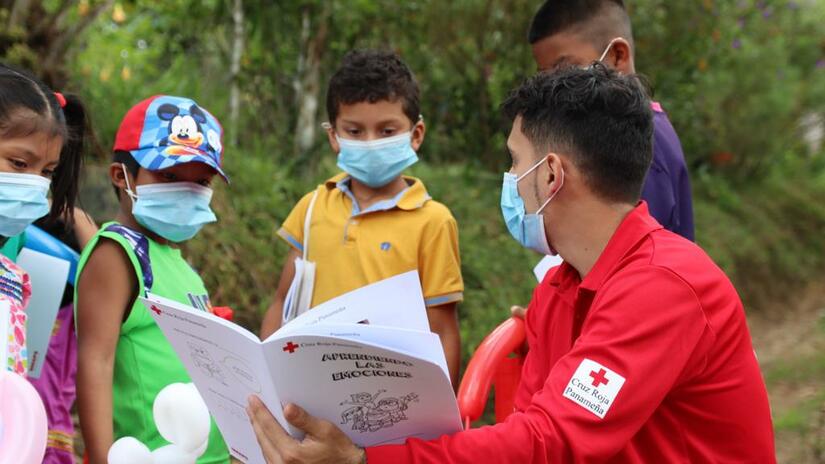By Olivia Acosta
Last November powerful Hurricane Eta, the second strongest hurricane for the 2020 Atlantic Hurricane Season, caused last November in Panama landslides, flooding and strong winds, forcing thousands of people to leave their homes. The Panamanian Red Cross deployed an emergency operation to respond in different isolated communities in the western part of the country, through search and rescue activities; distribution of food, blankets and shelter; access to hygiene and drinking water; psychosocial support and reestablishment of family contacts, among others.
According to Nadia de la Cadena, PER (Preparedness for Effective Response) focal point of the Panamanian Red Cross, one of the main obstacles they faced was the distribution of aid, in a disaster context aggravated by the Covid-19 pandemic, which hindered the response due to mobility problems and limited product procurement. The Panamanian Red Cross teams realized that it was necessary to strengthen local logistical capacity in order to provide a better response to the affected communities. "Providing an effective response in this emergency, in which we also had to deal with the Covid-19 pandemic, was very complex. We found that, if we didn't have sufficient capacity to distribute, a coordination alliance could be established with other actors to be able to do so".
And they were able to realize this, because for the first time they implemented the Preparedness Approach for Effective Response, through the Readiness Check, which allowed them to evaluate and improve their response mechanism of the components that had already been identified in previous assessments last year. The interesting thing about this experience, according to Nadia, is that by detecting weaknesses they were able to adjust and improve their response during the emergency itself, to help more people."We conducted a preparedness check and deleted that we had weaknesses in logistics, communication, and coordination with authorities and other actors on the ground. Immediate solutions were sought and the response was undoubtedly more effective, appropriate to the real needs of those affected."
One of the keys to the response was the coordination with different actors in the field. The Panamanian Red Cross, after assessing needs and adjusting the response (communication, participation in the national operations center, improvement of equipment, etc.), received national and international support to provide additional aid for the affected communities. "We met with authorities, mayors and governors, which made things much easier because they provided us storage space and guards. And they did this because they were very aware of the work we were doing to support the population in the affected communities."
Krystell Santamaria, IFRC Senior Preparedness Officer for Covid-19 and Panamanian Red Cross volunteer, was supporting the identification and improvement of the response. "The improvement in the response in this emergency has been evident, the affected people have also perceived it. A lady from one of the most affected communities, in Corotú Civil area, confirmed to us that during these floods far fewer people had fallen ill than in other similar situations. She was very clear that it was due to the distribution of drinking water, chlorination and cleaning of wells that we carried out”. She said. “The people in the communities we have supported were very grateful and thanked the volunteers by sharing their oranges and bananas with them”.
In addition, according to Nadia, the presence of volunteering at the local level is an added value, because it has been possible to support indigenous communities by volunteers who spoked their same language. "I want to emphasize the total support of the president of the Panamanian Red Cross and the Governing Board to all processes and to the hundreds of volunteers who made this response possible. Volunteers certainly deserve great recognition."
The improved emergency response also contributed to increased visibility of the activities of the Panamanian Red Cross, which meant more media impact and greater support from national and foreign donors. An example of this was the donations from the French government for the purchase of vehicles and from other local companies for the transportation and delivery of aid, drinking water and non-perishable foodstuffs, among others.
In 2019 the Panamanian Red Cross started working on the implementation of the PER approach through facilitators' workshops and awareness conferences. "This approach is the result of experience and best practices learned over many years responding to emergencies around the world. It is clear that investing in disaster preparedness in National Societies saves more lives and economic and social recovery is much faster."
In the case of the Panamanian Red Cross, through this approach they have identified the need, among others, to develop a procurement manual to secure supplies during an emergency, and a safe space is being set up to store aid and response equipment.
The Panamanian Red Cross is currently reinforcing fundraising to review and strengthen its response plan and capacity, and the development of the National Society's strategic plan, which will include all areas of improvement identified during the emergency, such as the establishment of processes and the search for new collaborators.
Article
Climate crises Q&A: Why have some recent storms gained so much strength, so quickly?
Climate crises Q&A: Why have some recent storms gained so much strength, so quickly?
| Article

